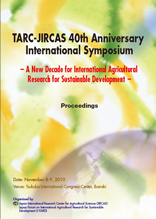Agricultural Research: Current Status and Challenges

The global food crisis of 2008, precipitated by a combination of factors, once again brought
the issue of food security to the forefront of public policy debates. Population growth and constraints
on food production with environmental degradation, key resource limitations, the anticipated affects of
climate change and shifting supply and demand patterns represent increasing challenges. These trends
must be balanced by improved and sustainable agricultural yields.
The track record of agricultural research is outstanding, notably evidenced by the Green
Revolution in Asia which provided food for up to one billion people. Within the development context
agricultural sector growth is vital to catalysing economic growth and achieving against the multilateral
agenda, particularly the Millennium Development Goals. Estimates show that GDP growth originating
in agriculture is twice as effective in terms of poverty reduction in developing countries, as growth in
other sectors. Agricultural productivity reduces poverty, raising farm incomes and resulting in price
reductions from increased food supply.
Increased productivity is closely linked to successful research and development. Despite this,
investment in agricultural research and development has fallen over time. Only recently has this trend
started to be reversed, having gained further momentum following the recent food crisis.
The crisis also served as a reminder that gains from past successes have not been shared
across the developing world, with Africa in particular falling behind. This has prompted calls for a
Green Revolution for Africa, and increased the pressure on agricultural research to achieve this.
Such calls, however, will not result in the improvements necessary unless the unique range of
factors, constraints, and environments ? biophysical, policy, market and investment ? are understood,
and the best minds are recruited to design targeted responses to help smallholder farmers and other
participants throughout supply chains.
What is necessary is a new approach that leverages intellectual capital to understand the
interaction of factors within a local environment and design a series of responses to spark a range of
mini-revolutions in productivity. These approaches must also focus on regional similarities, linkages,
complementarities and structures to address transboundary issues and opportunities. Regional research
partnerships should focus on boosting productivity to help create market opportunities and facilitate
access.
The Australian Centre for International Agricultural Research, part of Australia’s aid program,
delivers projects and programs that use this targeted approach. Australia is a world leader in
agricultural research, and shares the range of environments, and associated problems, common to
many parts of the developing world.ACIAR’s mandate is to help developing countries to help themselves, by enhancing spillovers
between Australia and developing country research, by brokering research partnerships across the
spectrum of public and private spheres, and by providing intellectual capital to agricultural researchers
in developing countries.
ACIAR is focused on addressing the challenges of raising farm productivity, sustaining
market integration and access, and institutional and human capacity building, through research
partnerships. These challenges are fundamental to the goals of the Australian aid program; achieving
lasting food security, rural development and economic growth across the Asia-Pacific region and Sub-
Saharan Africa.
| Date of issued | |
|---|---|
| Creator | Nick Austin |
| Subject |
Food security intellectual capital productivity |
| Publisher | Japan International Research Center for Agricultural Sciences |
| Available Online | |
| Issue | 2010 |
| spage | 67 |
| epage | 74 |
| Rights | Japan International Research Center for Agricultural Sciences |
| Language | eng |
